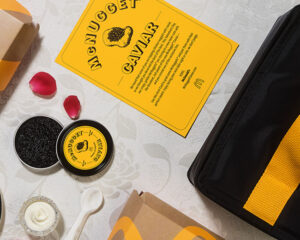
Protect yourself from identity theft in this digital world! Via Shutterstock
When we gab about our personal life on social media sites, we may very well be providing all the information scammers need to defraud us. Some banks are even changing the way they ID customers to reduce the risk of identity theft, says the New York Times‘ money blog, Bucks.
Prevent identity theft with these 7 9 tips.
Think you’re not at risk? Even if you’re tight lipped on Facebook and Twitter, you are STILL are at risk!
Does your bank ask for your Social Security number to verify your identity? Do you give out your zip code to cashiers?
Giving your zip code to cashiers can seem innocent, but many stores use that info to track down your address and send you a store catalog. Others sell your info to a data broker and that’s how you start receiving junk mail. Your junk mail (for example, pre-approved credit card offers) can then fall into the wrong hands. Yikes! In fact, two states — California and Massachusetts — have said asking for your zip violates their privacy laws. Reciting your social security number every time you initiate a conversation with your bank puts you at risk for having your number stolen.
Here are seven nine steps to protect your personal information.
1. Be very careful about what you share. Whether it’s online, on the phone, or to cashiers, avoid making it easy for scammers to find information to answer security questions. Skip posting info like pet names, or the high school you graduated from online, especially if your profiles are public. This info can allow scammers to easily answer security questions and break into accounts.
2. Create strong p@55w0rd5. Include numbers and symbols to keep your accounts safe. And whatever you do, don’t use one password for all your accounts! If you have trouble tracking your passwords (who doesn’t!) there are apps that will do this for you!
3. Keep your devices secure. Password protect your phones, laptops, and tablets. After I almost got my iPhone stolen, I set my mobile to delete all the information in case someone tries to break in after several attempts. A simple phone password makes your phone worthless to whoever finds it.
4. Keep your antivirus software up-to-date on all devices, including your smartphone. Nuff said.
5. Enter personal information on secured sites only. This is the best way to protect yourself if you like shopping online. Make sure the site’s address has “https” in front of it before you enter credit card info. The “s” stands for secure and is the important part. Be wary of retailers you’ve never heard of.
6. Skip clicking on links in emails. Instead, type in the site’s address. Many times hackers will disguise a link on a legit email to send you to a fake site to capture your info. Better yet, if the email contains nothing but a suspicious link, delete it from the get go.
7. Only use secure wireless networks. It’s best to skip a public WiFi when shopping online or doing your online banking. Using your smartphone’s internet connection is your best option.
8. Shred your receipts and anything that has your full name on it. Better to be safe than sorry! And you never know who may see your trash or recycling.
9. Freeze your credit. It’s the safest way to make sure nobody opens a line of credit in your name.
Stealing documents out of your trash is a declining crime (thank goodness for paper shredders!) — but protecting yourself online is a growing concern! BB almost got her identity stolen.
How do you keep your personal information safe?


I have often refused to give out my zip code and have had cashiers tell me it’s required. It is not. They’re just trying to fill a quota. I tell them to put in their own zip or the zip of the store, but I’m certainly not confirming mine.
@Dona You’re right! You are not required to share your zip.
@Dona Collins I need to be more firm, like you. I often give my zip code out, but I shouldn’t. Going to promise not to give it out again!
@Yazamin or anyone ~ Re #2: Can you recommend a good app to remember passwords? I know Google Chrome has a setting that permits this, but I would like to investigate other apps that do this.
@Diane I don’t know one off the top of my head, but I’ll ask around and see what I find.
@Diane 1Password is known for it’s simplicity and security. Not only does it save your password, but it also helps you create strong ones. You can use it on Mac, Windows, Android, and iPhone. It costs about $50 — but the price is worth it. More info here –> https://agilebits.com/onepassword
SecureSafe is another option. You can use it for iOS and Android. Plus, it’s free. More info here: http://www.securesafe.com/
@Yazmin ~ Thank you very much for the info.
@Diane and Yazmin I asked around and here is what four friends suggested:
-We use 1Password on our computers, which works great. I know there is an app version but we haven’t tried it yet.
-LastPass is popular for that
-I use last pass for computer, the app costs $$ so I haven’t bought it yet but think I probably will.
-I use a little notebook with evrything written down. works perfectly.
@BB ~ Thank you for following up as well. What I have done for years is keep my passwords written down and tucked away in a drawer for easy access as you have with your notebook. From the blog, I thought there was a free app that would substitute for this. I wanted it for my use in Google Chrome, so I did a search for apps there. So far, I haven’t found what I’m looking for but somehow found, via Chrome Settings, that the passwords I’ve opted to save are all there! But that also means that if someone knowledgeable about Chrome hacked into my computer, that person would be able to access them. 🙁 If I continue to look for an app and find one, I’ll let you know.
@Diane A good app that securely keeps track of all your passwords may be worth paying a few bucks for, don’t you think?
I think one of the worst offenders of getting your social security # out to potential ID thieves is the S S administration itself. Every time I get correspondence from them, every single page has my full # on the front and the back. The govt. spends thousands printing up brochures on ID theft and then sabotages you by sending your # on mail that anyone walking by could take out of your mail box. Way to go.
@Steve K Wow! That’s incredible. I didn’t think anyone mailed ANYTHING with your full account number or ID number. That’s ridiculous. But I’m guessing there’s no way to change a policy like that.
@steve k ~ You are so right regarding your comment about the gov’t. Medicare uses your SSN as your ID! How do you spell S-T-O-O-P-I-D?
These are very good tips that I’ll be keeping in mind from now on! Technology is so advanced nowadays that we need to take even more precautions to keep our financial information safe.
@Magali Gash How true! The danger with social media is that we forget how public the info we share is.
I called my congressman today about it but I’m not getting my hopes up about anything changing soon.
@Steve K That’s awesome! Very impressed you took action. Perhaps we should start an online White House Petition. Apparently, you can make them on any topic. Star Trek fans recently got tens of thousands of signatures on something to do with spaceships.
I read that if you put an accented letter on your password, the chances are very low to get your account hacked.
@Karyn S Never thought of that! An accented letter is pretty rare so that makes sense that it would make for a very secure password.
Lots of people are unknowingly letting themselves known and thefts are happening everyday. Be cautious